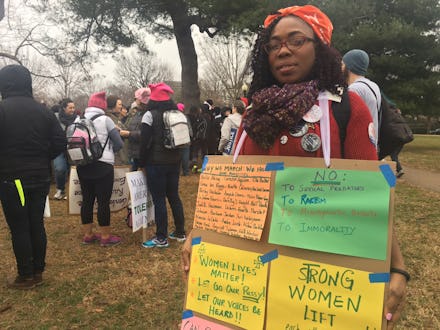Black activists rally for domestic workers, immigrants — just outside the Women's March

WASHINGTON — If there was one major concern of some black activists regarding Saturday's Women's March on Washington, it was that the voices of the most marginalized women of color didn't have prominent billing.
That's why a group of women and men representing domestic workers, undocumented immigrants and the working poor met less than a mile from the march's rallying point to elevate their voices. They supported the march, but wanted to affirm their cause, one day after the inauguration of Donald Trump, who they see as a direct threat.
"This is a march that should highlight our voices, the grassroots," Melissa Miles, an organizer of the social justice agency Ironbound Community Corporation in Newark, New Jersey, said at a rally in Garfield Park. "That's why we're over here."
In an interview with Mic, Alicia Garza, co-founder of the Black Lives Matter Global Network and an organizer with the National Domestic Workers Alliance, said it was important that activists not allow their voices to be drowned out in the sea of thousands gathered at the Women's March.
"I know there's been a lot of critique about this march, with folks saying, 'Oh, it's a white women's march," Garza said in the interview. "But look at all these beautiful people. We're not here to prove our humanity. We're here to lift ourselves up, to lift each other up and chart a new path towards the democracy we deserve."
Lydia Scott, a 53-year-old babysitter and NDWA supporter from New York City, said many black immigrant women like her lack the provisions like time off and sick pay that many working women take for granted.
"Half the time, we don't get the chance to express ourselves," Scott, an immigrant from Grenada and mother of three adult children, said. "Financially, [domestic workers] can't leave their jobs to be here. Their bosses wouldn't tolerate this."
"I'm here sacrificing so that my own children won't feel ashamed," Scott said. When she told her children why she was attending the march, they responded, "Right on mother!"
Well-known facts about the status of women in the U.S., such as the pay disparity compared to men, often don't cover black female immigrant workers, Toni DaSilva, an NDWA supporter and immigrant from St. Vincent and the Grenadines, said in a interview. "Not to have data on them is an atrocity," she said. "Because you can't plan for them, they become a phantom group. They go through all sorts of issues that maybe can't be highlighted because of their status."
The assembled women had a significant amount of support from men. Timothy Doe, an immigrant from Togo who works as a caregiver for the developmentally disabled, said his rights are inextricably linked to the status of women of color who do the majority of domestic work.
"Men have to be a bigger support for the women, because the woman is the power of our life," Doe said. "They are our mom, our sisters, our daughters, our wife, our girlfriend. So, the men must stand up and support the women."
The delegation in Garfield Park rallied for an hour and made a procession to the march, where speakers highlighted issues important to the women of color. Newly elected African-American U.S. Senator Kamala Harris fired up marchers with a speech about equality for women.
"If you want to talk about women's issues, that's fantastic, great!" she roared. "Let's talk about health care. Let's talk about education. Let's talk about criminal justice reform. Let's talk about climate change."
Black female celebrities also had top billing at the march. Singer Alicia Keys stopped the show with a stripped-down rendition of her hit, "Girl on Fire."
But anxious marchers, who had already been listening to speakers and performers for hours, seemed less receptive to singer and actress Janelle Monáe. She invited the Mothers of the Movement — women whose sons Trayvon Martin, Eric Garner, Jordan Davis and others died by vigilante and police violence — on stage to lead a "say his name" chant. As each mother took their turn shouting their son's name, some marchers yelled "let us march," instead.
"Show some respect," Jibby Ani, a black Washington resident, recalled saying to people around her who were jeering. "I just felt a little marginalized, in that moment."
Jan. 22, 2017, 7:49 a.m.: This story has been updated.